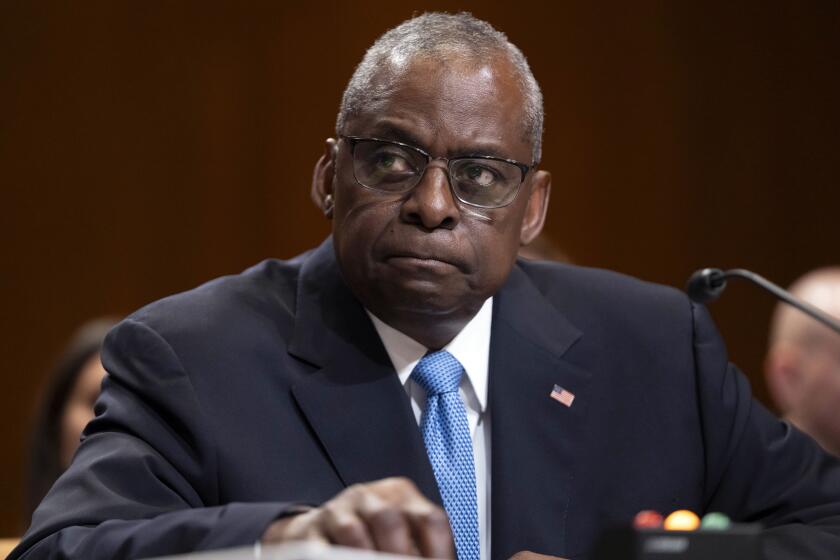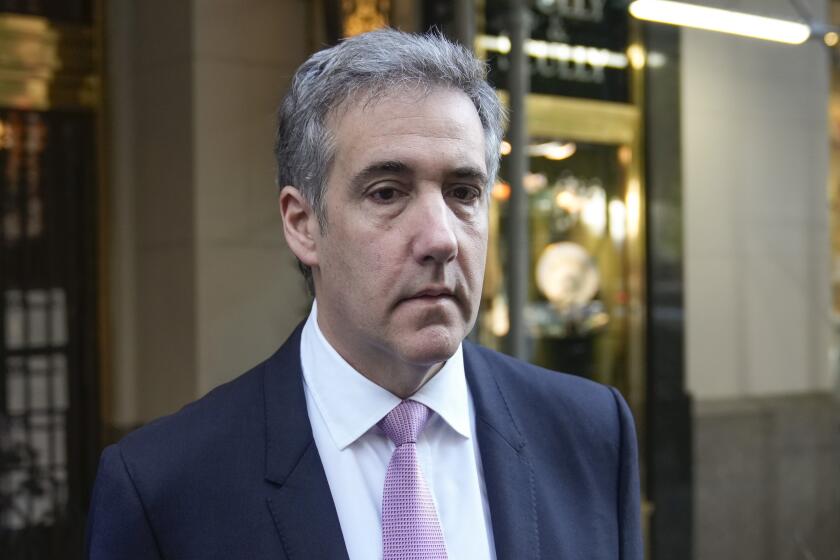Homeland Security Measure Dominates in Senate Session
The Senate voted decisively Friday to force final action on a major homeland security bill, but Democrats charged that the fine print contained needless breaks for drug companies, airport security screeners, offshore tax evaders and even Texas A&M; University.
Republicans warned that a Democratic amendment to block those provisions could kill the bill, which President Bush made the top priority for the lame-duck Congress.
And in other developments on legislation concerning terrorism, the Senate cleared for Bush’s signature a bill establishing an independent commission to look into government breakdowns exposed by last year’s terrorist attacks. It also scheduled a final vote for next week on a bill that would give the insurance industry support in the event of future terrorist strikes.
But what held center stage Friday was the bill to authorize creation of a Department of Homeland Security.
First, the Senate voted, 65 to 29, to force action on the bill, and scheduled a final vote for next week on the most significant government reorganization in more than 50 years.
In the preliminary vote -- a victory for the Bush administration -- 17 Democrats joined 47 Republicans and one independent to thwart any filibusters. California’s senators, both Democrats, were divided: Dianne Feinstein supported the president’s position; Barbara Boxer opposed it.
Then, sharp debate erupted over details in the 484-page homeland security bill that had received little notice before the House approved it Wednesday.
The bill, assembled by White House and congressional negotiators last weekend, spells out the structure and duties of a new Cabinet department projected to have roughly 170,000 employees drawn from 22 federal agencies. The largest among them are the Coast Guard, the Transportation Security Administration, the Immigration and Naturalization Service and the Customs Service.
But the bill also contains seven GOP-favored provisions that have drawn scathing attacks from Democrats. Three of those concern liability protections for businesses.
For instance, drug companies that make mercury-based vaccine preservatives would win special protection under language inserted in the bill for the first time within the last week.
Democratic Sens. Tom Daschle of South Dakota and Joseph I. Lieberman of Connecticut said the provision would undermine pending lawsuits that allege such preservatives have caused autism in children.
GOP Sens. Bill Frist of Tennessee and Phil Gramm of Texas countered that their goal was to help ensure that drug companies would be able to supply products useful for protecting people against biological terrorism attacks. Vaccines have been a focus of government planning for defense against attacks of smallpox and other deadly agents.
The administration also weighed in. White House spokesman Scott McClellan said the vaccine provision would not bar parents or others from suing vaccine makers. Rather, it would require them to seek compensation first through an out-of-court award program, he said.
“We support [the provision’s] being in the legislation,” McClellan told reporters. “That’s our position. And we urge Congress to act and get this legislation to the president’s desk quickly.”
The two other liability-limiting provisions would authorize the homeland security secretary to grant legal protection to businesses that sell certain “anti-terrorism technologies,” and would provide a similar shield to airport security companies. Those provisions, though, were not entirely new. Similar language was approved by the House in July.
Democrats also objected to four other provisions, which they said would:
* Shield the new department from certain open-government laws;
* Create barriers to the issuance of emergency security rules for airlines and railroads;
* Neutralize a Senate-approved measure to bar government contracts with corporations that have moved their headquarters offshore to avoid U.S. taxes; and
* Give Texas A&M; the inside track for a government-funded homeland security research center.
The university is not mentioned in the bill by name. But Democrats said the criteria for the center spelled out in the bill pointed directly to A&M.;
“Let’s take out all this terrible special-interest legislation that has nothing to do with homeland security,” Daschle said.
Gramm defended most of the targeted provisions as measures that would help ensure efficient government. The provision concerning the research center, he conceded, was somewhat less defensible.
But the former A&M; economics professor insisted that the university in his home state was only one of several -- including the University of California -- that could land the center.
Gramm also said he was not personally responsible for the language. Its authorship, like that of many of the provisions in the bill, was not clear. But several key Texas Republicans in the House had a hand in drafting the overhaul bill, including Majority Leader Dick Armey and Majority Whip Tom DeLay.
Texas A&M; also houses the presidential library of former President Bush.
The Democratic amendment to block the provisions -- also scheduled for a vote next week -- is significant not only for the substance of the issues involved. It also matters a great deal procedurally, which is why Republicans warn that the bill could be imperiled.
The reason is that the House may decide not to approve changes made to the bill.
Under the Constitution, both houses of Congress must approve identical legislative language before a bill may be sent to the president.
The House sent the Senate its bill, then left Washington after wrapping up work early Friday. Most House members believe the chamber is done for the year, though it will meet next week -- in a session expected to be sparsely attended -- for routine business. Whether lawmakers can be called back to Washington for a vote on Senate revisions to the homeland security bill is unclear.
Senate Democrats said any revisions could be waved through the House on a voice vote because that chamber has approved two versions of the bill this year by wide margins.
“Would the House let it die?” asked Sen. John B. Breaux (D-La.). “I don’t think so.”
However, John Feehery, a spokesman for Speaker J. Dennis Hastert (R-Ill.), said the House would be unlikely to send such a major bill to Bush without a recorded vote of its members. Senate amendments, Feehery said, could kill the bill.
*
Times staff writer Richard Simon contributed to this report.
More to Read
Get the L.A. Times Politics newsletter
Deeply reported insights into legislation, politics and policy from Sacramento, Washington and beyond. In your inbox three times per week.
You may occasionally receive promotional content from the Los Angeles Times.






